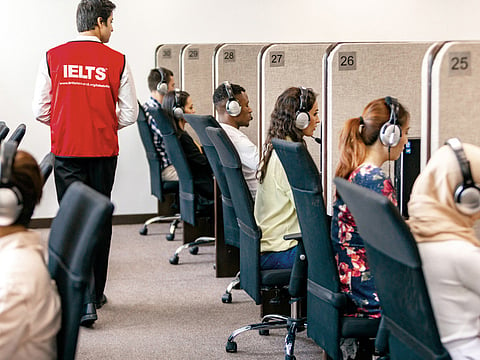Learning English language is such fun
After three hours, I still do not know how I did in the test

“Remove your mask and glasses and look at me,” said the man behind the desk, while a woman was shouting: “Switch off your mobile phones.”
“Press your index finger here,” said the man. Then after a few seconds, “Again”. Then he said it the third time, “Again.”
“If you need to go to the toilet, it is to your right. The exam is of three hours duration and no one will be allowed to go the washroom,” said the woman, and I swear I could hear someone sobbing softly in deep stress.
“Come back immediately, and sit in that enclosure, ” the woman said.
“Hold up your passport, the page with your picture,” said the man, behind the desk. He looked at my picture and said, “Look at me. Press your index finger once again on this,” he said pointing to the device that was blinking a blue light.
I remembered a TV series on Netflix about a married woman who was caught with a small amount of drugs, and was sent to prison. I also remembered an action movie where the crooks hit the bank manager unconscious and hold him up and press his finger on the keypad, and voila, the vault door opens.
I was shaken up from my reverie. “Put your belongings, except your passport in locker number one. Remove your watch, your wallet, and, wha ..., what is your mother doing in this test centre?”, said the woman to a hapless female, who was a few minutes late.
“I have an important announcement to make,” she said then, a little softer. “If you are caught cheating, your answer book will be taken away from you and you will never again in your whole life, ever sit for the test.
“If you talk to your fellow test taker, your answer book will be taken from you and you shall never darken the door of this test centre or any centre, again.”
The test centre is tucked away in a quiet and a greenery-filled lane near Cubbon Park in Bengaluru. I was here to give my IELTS (International English Language Testing System) in four areas, Listening, Reading, Writing, and Speaking.
Earlier, one poor test-taker had asked his fellow mates on Facebook which movies to watch to improve his English. In my dazed state I could not think of anything illuminating to say, because I was studying English grammar like a crazy granma, and wondered what a dangling modifier was, but I told him never to watch Clint Eastwood movies if he wished to learn English.
Listen to Elton John songs I said mischievously. BTW, I keep hearing the lyrics from the song, “Hold me closer, tiny dancer” as, “Hold me closer, Tony Danza”, the guy who acted in the TV series, “Who’s the Boss.”
(In the Listening section we were warned that we would hear people speaking in various accents).
I was a reluctant test-giver, because when I said that I worked for hundreds of years as a journo, my experience was pho-phoed, dismissed. They said it did not matter if I was a professor of English, but I had to take the test.
I asked my wife to ask her students how the test was for them, as the kids were applying to join Canadian universities. “Everyone said it was easy-peasy,” said my wife.
I was sweating buckets as my spelling is bad and I always relied on spellcheck, though sometimes it got me in trouble with my editor (“Saberi, what does this mean?”).
I went on You Tube and every tutor there was: “You think you know how to write or speak English? Let me be frank, nobody is good at English. I had to take the test two times, even though I am from Cambridge.”
After three hours, I still do not know how I did in the test. One part was to explain how a hydroelectric power station works, by looking at a diagram, and the other, to analyse a graph that showed people eating a lot of junk food at dinner, all in 250 words.
Mahmood Saberi is a storyteller and blogger based in Bengaluru, India. Twitter: @mahmood_saberi








